Hello! Welcome to our review of the best smart routers in the world right now.
Routers that integrate with smart home devices are all the rage right now. So we’ve been testing a load of them out to find out which come out on top.
We believe that the absolute best in terms of its smart home compatibility is the TP-Link Archer AX73. It’s packed with power and useful features for smart devices, plus it allows you to connect tons of smart devices.
TP-Link Archer AX73 AX5400
Best Overall
- Type: Wi-Fi router
- Tested max speed: 827.85 Mbps
- Recommended for: 1 Gig plans and below
- Max number of devices: 200
- Wireless standard: Wi-Fi 6
- Warranty: Limited lifetime
But there are plenty of other options to check out. One of them might be better suited to your personal circumstances (for example, the size of your home or your internet plan).
So make sure you look at the rest of our top picks too.
Let’s go!
Top 7 Smart Home Routers
Here’s a quick summary of our top picks before we dive in and explain our decisions.
- Best overall: TP-Link Archer AX73
- Best for budget: TP-Link Archer AX10
- Best Mesh router: ASUS ZenWiFi AX AX6600
- Best for speed: Netgear Nighthawk RAXE500
- Best for security: ASUS RT-AX3000
- Best budget Mesh system: TP-Link Deco AX20
- Best for user experience: Google Nest Wi-Fi
7 Best Routers for Smart Homes
Here are short reviews of the best routers for smart homes we have tested. For a more in-depth review, click the link at the start of the review.
#1 Best Overall: TP-Link Archer AX73
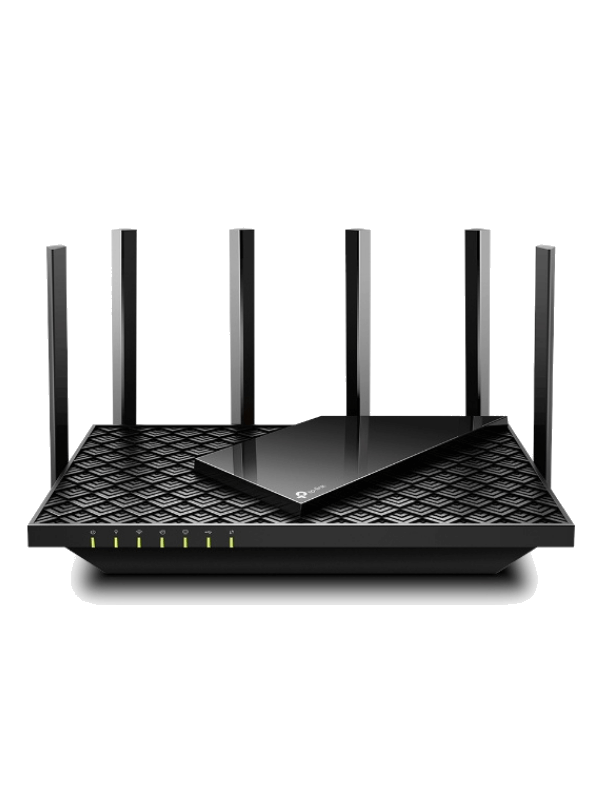
- Type: Wi-Fi router
- Tested max speed: 827.85 Mbps
- Recommended for: Plans up to 800 Mbps
- Recommended for: 40-50 Smart devices
- Wireless standard: Wi-Fi 6
- Warranty: Limited lifetime
Pros
- Connect up to 200 devices at a time
- Excellent free security
- Huge top speeds
- Very high natural range
Cons
- A little expensive
The way the TP-Link Archer AX73 performs when many devices are connected to it makes it the perfect router for smart homes in our eyes. Plus, it has great security and fast speeds. What more could you want from your smart home?
It’s possible to connect up to 200 devices to this router at any one time. This means you can add all your smart tech and leave room for plenty of computers, cell phones and more.
Connecting this many devices isn’t strictly recommended as you won’t get great performance on all of them. But it’s still good to know that you won’t have any issues getting a lot of devices online.
Another reason it’s great for smart devices is the security. You’ll get free HomeCare with this router. This is TP-Link’s epic bundle of antivirus and parental controls. It’ll keep your smart home connected devices safe as well as any vulnerable users using your network.
On top of all that, the AX73 offers excellent performance. We tested the speed on a Wi-Fi 6 device from 5 ft away and managed to get a massive speed of 827.85 Mbps from it.
Distribute that between your smart home devices and they’ll all perform very well with bandwidth to spare.
Plus, we found the range of the AX73 to be very strong. Our tests showed that it could hold a signal as far as 100-110 ft away. That’s about as good as it gets for traditional router range. It should be plenty for a medium-sized or even a large home.
If you want to extend that range seamlessly, you can. The AX73 comes with Mesh readiness through AiMesh, which means you can add Mesh satellites to it.
A final positive note on this router is that you get the best QoS with it. This is particularly useful for smart homes as it allows you to prioritize connected devices when you need to.
If you need an extra injection of speed from one or some of them, you can throttle the performance to others temporarily in order to achieve this.
Sure, the AX73 is on the expensive side. But what you get from it in terms of performance and features justifies that. This really is the perfect router for smart homes!
#2 Best for Budget: TP-Link Archer AX10
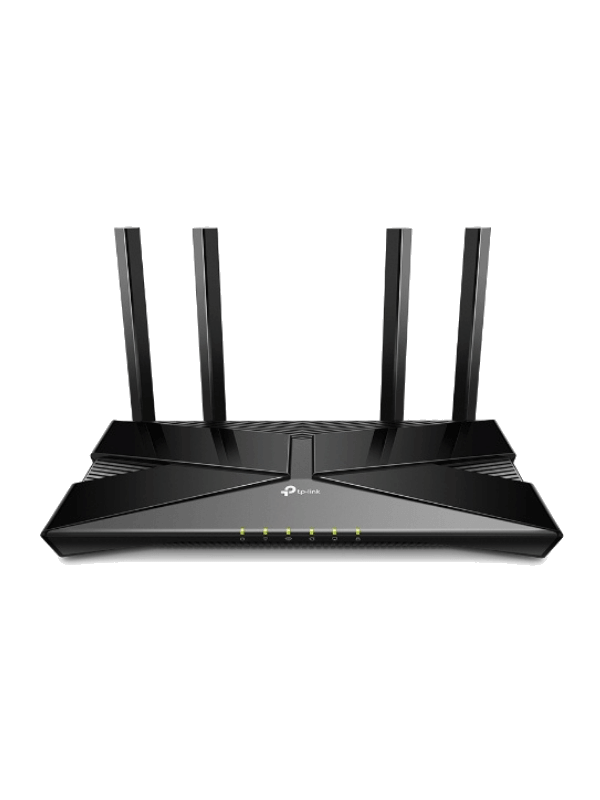
- Type: Wi-Fi router
- Tested max speed: 651.97 Mbps
- Recommended for: Plans up to 600 Mbps
- Recommended for: 15-20 Smart devices
- Wireless standard: Wi-Fi 6
- Warranty: Limited lifetime
Pros
- Brilliant value Wi-Fi 6 router
- Very quick for the price
- Fairly good range
- Comes with QoS
Cons
- No USB ports
The TP-Link Archer AX10 is a (fantastic value) Wi-Fi 6 router. This means it utilizes technologies like MU-MIMO and OFDMA to maximize network performance even when many devices are connected. That makes it the perfect budget option for smart homes.
It’s quick, too. Our tests showed that it could achieve a top speed of 651.97 Mbps. That’s considerably faster than a few more expensive routers. Impressive stuff!
You won’t have to compromise too much on range either. We found it to be around 80-90 ft for this router, which is pretty average (or good for a budget router). That’s enough for a medium-sized home.
You’ll just need to use a standard Wi-Fi extender if you want to boost it as there is no Mesh functionality for this router.
Unlike some budget routers, this router comes with QoS. It’s a bit limited in its features, but you can still use it to give certain devices particular network attention when you need to. That’s another reason it’s great for homes with a lot of smart home devices.
In terms of security, there is no HomeCare. However, the device comes with a strong firewall and WPA3 encryption, so your devices should be pretty safe when connected to it.
In fact the only downside we could find with the AX10 is that it has no USB ports. This means you won’t be able to plug in any external hardware, such as a printer. But that shouldn’t cause a problem for most users.
The AX10 just goes to show that you don’t need to spend a lot of money in order to get a router for smart homes. It’s just not ideal if you have a particularly large smart home.
#3 Best Mesh system: ASUS ZenWiFi AX AX6600
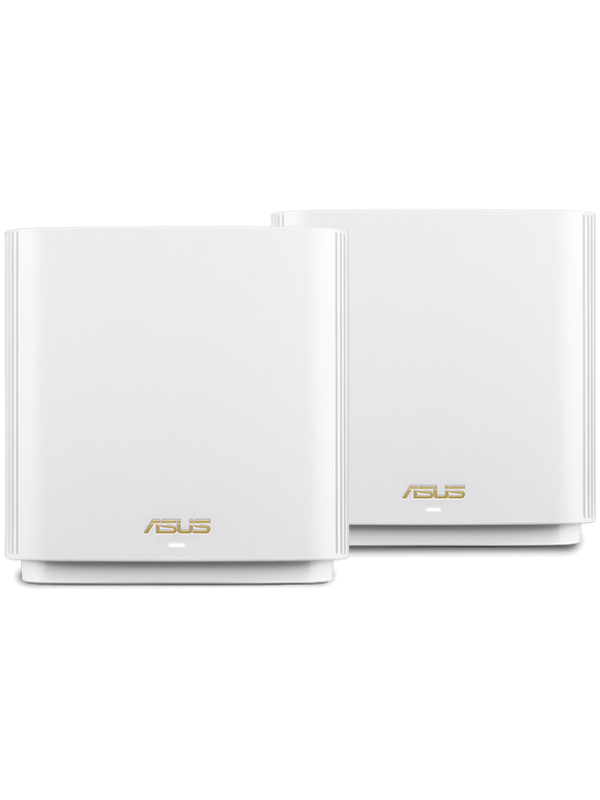
- Type: Wi-Fi Mesh system
- Tested max speed: 836.45 Mbps
- Recommended for: Plans up to 800 Mbps
- Recommended for: 50-70 Smart devices
- Wireless standard: Wi-Fi 6
- Warranty: Three years
Pros
- Third 5 GHz band improves connection
- Great connection between Mesh satellites
- Alexa compatibility
- Free AiProtection Pro antivirus
Cons
- No WPA3 encryption
If you do have a large smart home, consider Mesh. And if you’re considering Mesh, consider the ASUS ZenWiFi AX AX6600.
We think it’s the best Mesh system on the market right now and it’s perfect for smart homes thanks to great speed, security and connection to many devices.
Mesh means you can connect between additional satellites seamlessly, extending your network range while keeping it all under the same name.
The AX6600 is a particularly good example of Mesh as it is a tri-band system. That third band improves connection between satellites meaning you can get good speeds even with a lot of satellites added.
It also improves connection to devices. Adding a second 5 GHz band frees up bandwidth on the band so that more devices can get faster speeds from it. That’ll be very useful if you have a lot of smart home devices.
And on that 5 GHz band, performance is fast. We managed to get a top speed of 836.45 Mbps from it, which is very quick indeed.
Security is good on this Mesh network too, for the most part. It comes with AiProtection Pro free for as long as you own it, meaning great antivirus technology. That bundle also includes fantastic parental controls!
However, there is no WPA3 encryption which might concern some. It means your personal data won’t be quite as highly protected as with some other routers.
Finally, the AX6600 comes with Adaptive QoS. You can use this to select a handful of devices to receive more attention from the network should you wish to get more speed from them temporarily.
The AX6600 is a little expensive but it’s more than worth it for what you get. This really is the perfect Mesh system for smart homes.
#4 Best for Speed: Netgear Nighthawk RAXE500

- Type: Wi-Fi router
- Tested max speed: 1203.59 Mbps
- Recommended for: Plans up to 1 Gig
- Recommended for: 60-70 Smart devices
- Wireless standard: Wi-Fi 6e
- Warranty: One year
Pros
- Third band improves connection to many devices
- Immense speed
- Great range
Cons
- No QoS tool
- Not many devices can connect to 6 GHz band yet
The Netgear Nighthawk RAXE500 is one of the fastest home routers in the world right now. It utilizes brand new Wi-Fi 6e technology to smash the 1 Gig mark over Wi-Fi. Plus, it can connect to tons of devices while offering a good security plan.
Our tests showed that using this new technology, it can achieve an amazing speed of 1203.59 Mbps. Wow!
However, this speed is only available on select devices right now. They’ll need to be able to support the new 6 GHz band, and not many can just yet. Only a handful of smartphones (such as the Google Pixel 6 and the Samsung Galaxy S22 Ultra) can, for example.
That being said, the Nighthawk is still pretty quick on the 5 GHz which is available for most devices. And because there are three bands (including the 2.4 GHz one), there’s a lot of devices to go around. This is good for smart homes as you can get good speed on many devices.
Strangely though, there’s no QoS for this router. This means you can’t prioritize particular devices when you need more speed from them. That might be a little annoying if you have a lot of connected smart home devices.
In better news, the RAXE500 has a strong range. We found it to be around 100-110 ft which should cover a medium-large home. And if your home is larger, you can boost the range seamlessly thanks to Mesh capabilities.
Top tier security is available for the RAXE500 but you will need to pay for it. The Netgear Armor tool offers some of the best antivirus in the world but you need to pay an annual subscription for it.
That’s not good news for those on a budget as this router is already very expensive as it is.
For pure speed, the RAXE500 is a great router for smart homes. Just be prepared to make a very heavy investment to buy it, and to upgrade to Netgear Armor each year.
#5 Best for Security: ASUS RT-AX3000
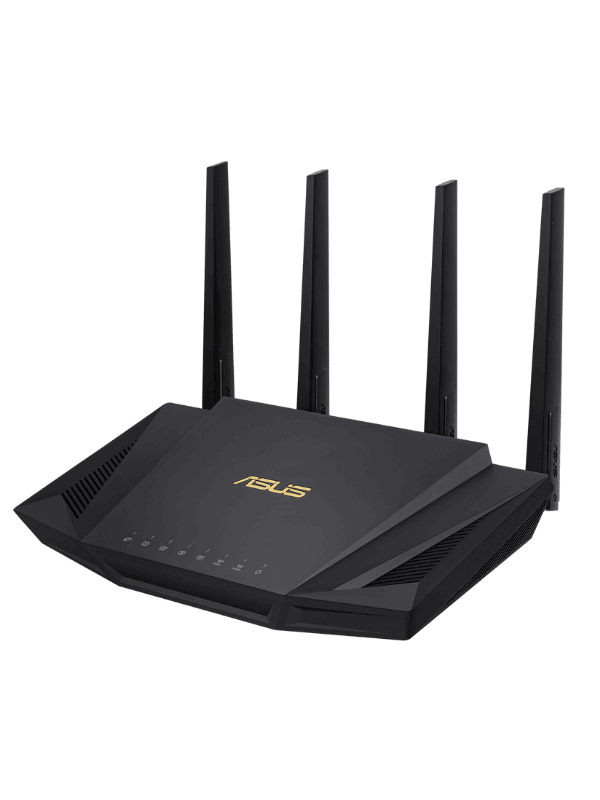
- Type: Wi-Fi Mesh system
- Tested max speed: 889.41 Mbps
- Recommended for: Plans up to 1000 Mbps
- Recommended for: 20-30 Smart devices
- Wireless standard: Wi-Fi 6
- Warranty: Three years
Pros
- Brilliant free antivirus
- Immense speed for the price
- Adaptive QoS for prioritizing devices
- WPA3 encryption
Cons
- Low range
Security is crucial for smart home routers as good network security can also protect all your connected smart home devices. We feel that the best free network security is through AiProtection Pro from ASUS, and the best value for money router to get it on is the RT-AX3000.
AiProtection Pro is an awesome bundle of top-tier antivirus technology and parental controls. Together, these will keep your smart home devices safe from outside threats and vulnerable internet users safe from harmful content.
The RT-AX3000 is also protected by WPA3 encryption. This is the latest Wi-Fi encryption standard and will go as far as can be gone to keep your sensitive data safe.
But security isn’t the only thing we love about this router. It’s fast. We managed an almighty top speed of 889.41 Mbps which actually makes it faster than more expensive routers in the ASUS RT series.
Another cool thing about the RT-AX3000 is its Adaptive QoS. Use this to assign profiles to devices such as ‘gaming’ to get more speed and lower latency out of those devices when you need it. That’s useful if you have a lot of smart home devices constricting the bandwidth.
The only bad thing about the RT-AX3000 is the range. We found it to be just 80-85 ft, so you’ll probably need to think about extending it if you live somewhere larger than a small house or medium apartment.
You can do that seamlessly with Mesh though. The RT-AX3000 does come with AiMesh, meaning you can add satellites to the same network name.
You can actually get ASUS’s AiProtection Pro technology for cheaper by opting for the RT-AX56U instead. However, we feel that it doesn’t offer as good value for money. The range is too short at 75-80 ft and the top speed is quite a bit slower at 784.09 Mbps.
So with that in mind, the RT-AX3000 is definitely the best value for money for smart home users who want great security.
#6 Best Budget Mesh System: TP-Link Deco X20
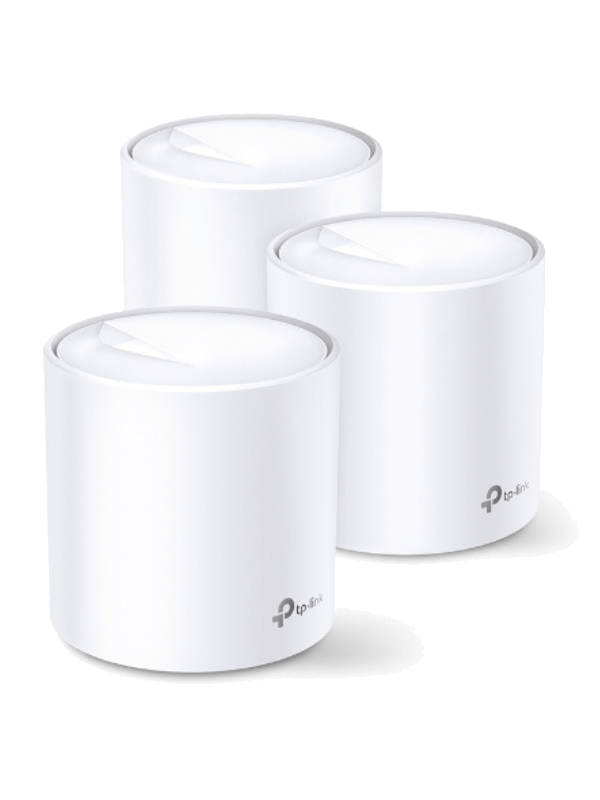
- Type: Wi-Fi Mesh system
- Tested max speed: 695.05 Mbps
- Recommended for: Plans up to 600 Mbps
- Recommended for: 15-25 Smart devices
- Wireless standard: Wi-Fi 6
- Warranty: Two years
Pros
- Affordable entry into Wi-Fi 6 Mesh
- Beautiful hardware design
- Free HomeShield
- Alexa compatibility
Cons
- Not as quick as other Mesh systems
We’ve established that Mesh is a great option for those with large smart homes. Now, we can tell you that the best budget Wi-Fi 6 Mesh system is the TP-Link Deco X20. It has everything you need for a smart home and all for a great price.
It’s important to stay with the Wi-Fi 6 theme as this Wi-Fi protocol enhances your router’s ability to connect to many devices. That’s really useful for a smart home.
The speed of the X20 is reasonable. We found that it topped out at 695.05 Mbps in our tests. It’s not quite as quick as other Mesh networks but should be more than enough for most smart homes.
A cool way that the X20 integrates with your smart home is through Alexa. You can use your voice to control a bunch of the network settings such as activating QoS and parental controls.
Speaking of QoS, the X20 allows you to prioritize particular devices on the network whenever you want. If your smart home devices are taking up a lot of bandwidth, you can temporarily throttle them to get better performance on your main devices when you need to.
It’s not the best QoS tool in the world (compared to the likes of ASUS or more upmarket TP-Link routers) but it certainly does the job.
Security-wise, the X20 is pretty good for a budget system. Instead of free HomeCare, it offers HomeShield for free. This is a stripped back version of HomeCare that offers slightly weaker parental controls and antivirus. But it still absolutely works.
So if you have a large home full of smart home devices and are on a budget, the X20 could well be the best option for you.
#7 Best for User Experience: Google Nest Wi-Fi
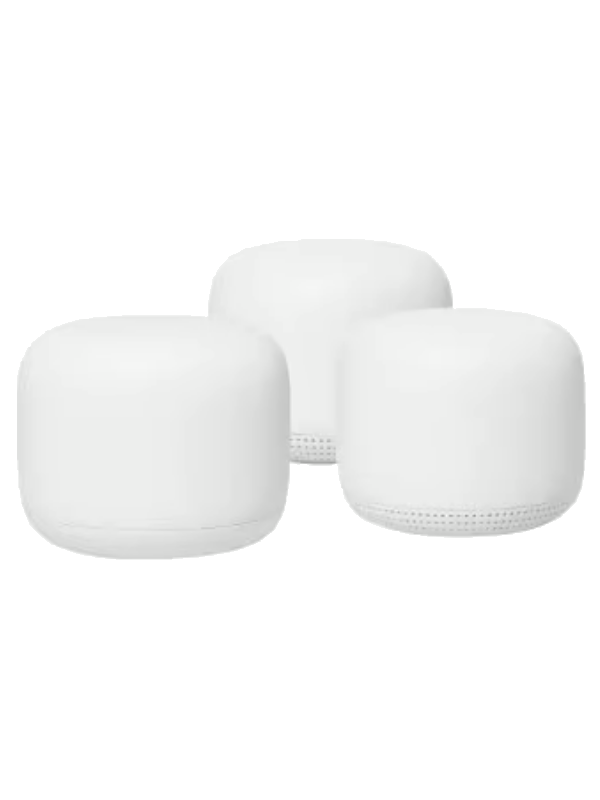
- Type: Wi-Fi Mesh system
- Tested max speed: 87.76 Mbps
- Recommended for: Plans up to 100 Mbps
- Recommended for: 20-25 Smart devices
- Wireless standard: Wi-Fi 5
- Warranty: Two years
Pros
- Excellent Google Home app connects devices
- Each satellite is a smart speaker
- Great voice assistant controls
Cons
- Very slow speeds
- Wi-Fi 5 so cannot connect to multiple devices as well
The Google Nest Wi-Fi Mesh system brings something different to the table. It integrates better with smart devices than other routers thanks to the Google Home app.
This app is by far better than that of any other router. It allows you to control all your smart home devices including your Nest network settings and we’re big fans of that.
Furthermore, you can use the Google voice assistant to speak to all your devices using the Mesh router and satellite and control many parameters of them with ease.
In addition, each Nest satellite doubles up as a smart speaker. Another cool little quirk that we love about this system!
Unfortunately we couldn’t raise it much higher in the rankings due to the performance. Frustratingly, this is only a Wi-Fi 5 system so it’s not as good at communicating with multiple devices.
Plus, it’s slow. We only managed to get a speed of 87.76 Mbps in our tests. As you can tell, that’s substantially lower than most other routers.
If you have a slow internet plan and a lot of Google-ready smart home devices, Nest Wi-Fi is definitely worth a look. Plus, it’s pretty good value.
Smart Home Router Buying Guide
Because smart home devices are becoming more and more popular, we’re seeing more and more smart home routers being introduced. So it’s good to stay on top of the trend.
Check below for our guide to finding the ultimate router for smart homes. You can use these tips for when the market inevitably changes in months and years to come.
If you still need help after, you can check out our more extensive overall ultimate router buying guide.
Smart device compatibility
Of course, the key aspect of a router for smart homes is the way it interacts with your smart devices. This can happen in a number of ways.
The most common way is through voice control. A lot of new routers come with Alexa compatibility which enables you to control your home network and all your smart devices.
Google takes this one step further by combining all smart devices in one neat app, Google Home. This means keeping control of your smart home is a lot easier and more satisfying in terms of user experience.
Wi-Fi 5 or Wi-Fi 6?
We recommend picking up a Wi-Fi 6 router for smart homes as they will allow your network to achieve faster speeds even when a lot of devices (such as smart home devices) are connected to it.
We generally recommend Wi-Fi 6 for those looking to connect 30 or 40 plus devices. So for smart homes with many users, this is probably the way to go. Wi-Fi 5 might not be able to handle it.
Wi-Fi 6 contains two key technologies that improve your network’s performance when multiple devices are connected to it. They are MU-MIMO and OFDMA.
MU-MIMO achieves this by directing the individual beams from the router to all connected devices, which results in fewer wasted beams and better performance overall.
OFDMA has a similar result except it does it by assigning subsets of subcarriers to the individual devices. Impressive stuff.
For more info on the differences between Wi-Fi 5 and Wi-Fi 6, you can check out this guide.
Dual-band vs tri-band
Tri-band routers will generally perform better in smart homes but they’re not essential.
A third band provides more bandwidth to the network overall, and this means more devices can reach faster speeds. For a smart home, this is useful as you are likely to have more connected devices.
That being said, if you have less than 30/40 connected devices, a standard dual-band router should be more than okay.
If you’re still unsure on which one to go for, check out this guide.
Security
A key area to consider for those looking to buy a router for smart homes is security. If your network becomes compromised, so too can every device that’s connected to it and that can be quite catastrophic if you have tons of smart devices connected.
We recommend buying a router that comes with antivirus for this reason. Antivirus will help keep your home network free from outside threats, and will therefore protect the devices connected to it.
We also recommend looking for WPA3 encryption. This is the latest Wi-Fi encryption protocol and it will go the extra mile to keep your personal data safe, such as financial records and other sensitive information.
QoS
A great tool for smart homes is QoS. Because you’ll have a lot of connected devices, you may wish to prioritize some of them for more speed and lower latency from time to time, and QoS lets you do this.
QoS varies in quality. The most basic is to simply prioritize a couple of devices. But some QoS tools allow you to select profiles for them such as gaming, which can really help you tailor your network to exactly how you want it.
Mesh or a Wi-Fi extender
We tend to recommend Mesh to anyone with a home of 3000 sq ft or more.
Mesh allows you to extend the range of your network by adding satellites that stay under the same network. This means you’ll never need to reconnect to a new network name in the same building.
Traditional Wi-Fi extenders, on the other hand, generally do not have this function.
Of course, this doesn’t have much of an effect on your smart home devices. Although, one trend we have seen is that Mesh systems tend to have better technology for integrating with smart objects, e.g. voice control.
Check out this guide for more info on the differences between Mesh and traditional Wi-Fi repeaters.
Warranty
Another point to note is warranty. If your router has a long warranty, you’ll be protected against any issues that may arise from it.
Some routers have one year (the bare minimum), some two, some three and some lifetime!
Smart Home Router FAQ
Here are a few of the key questions people have been asking about buying a router for a smart home.
Do I need a dedicated router for my smart home tech?
Some people like to have one network for their smart home devices and another for their personal devices such as games consoles, computers and cell phones. Is it necessary? They seem to think so.
The benefits of this include improving security, reliability and bandwidth. More than one network means that if one becomes full or compromised, the other one will still work fine.
We think this might be overkill a little bit, but if you have a lot of devices to connect, it could be worth a look at.
Can I use my voice to control all my smart tech?
Some routers allow you to control their features and settings with your voice thanks to voice control. It saves you having to load up the app or the network config page, which can spare you time.
With brands like Alexa and Google Assistant, you’ll be able to talk to all of your devices to control their settings and functions. This is one of the key features of smart homes these days and it can make your life a lot easier!
Which other hardware do I need to get online?
If you have a cable connection, you’ll also need to buy a modem if you opt for any of our top picks today. While some routers come with a built-in modem, most don’t.
Here is our guide to the best modems. You can use it to find the perfect partner for your new smart home router.
Last Thoughts on Routers for Smart Homes
The TP-Link Archer AX73 is an amazing router for smart homes. It allows you to connect to tons of devices, has great security and more. But it was a really hard decision to make.
At the end of the day, the best router for a smart home really depends on your personal circumstances. The size of your home, your internet plan and the kind of smart home you’re looking to set up are some key factors.
Make sure you check out our smart home router buying guide before you buy, and good luck with making your decision.
